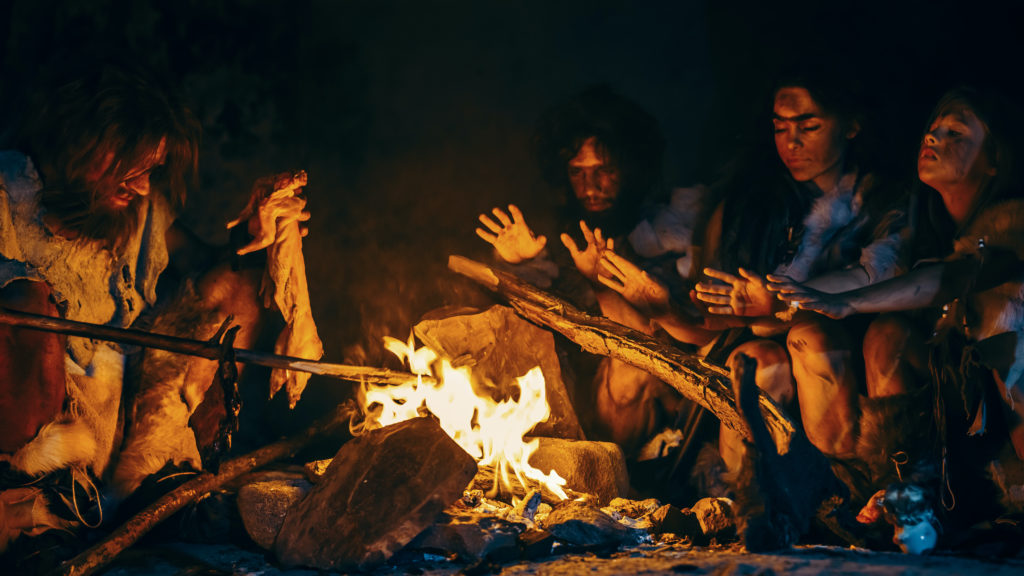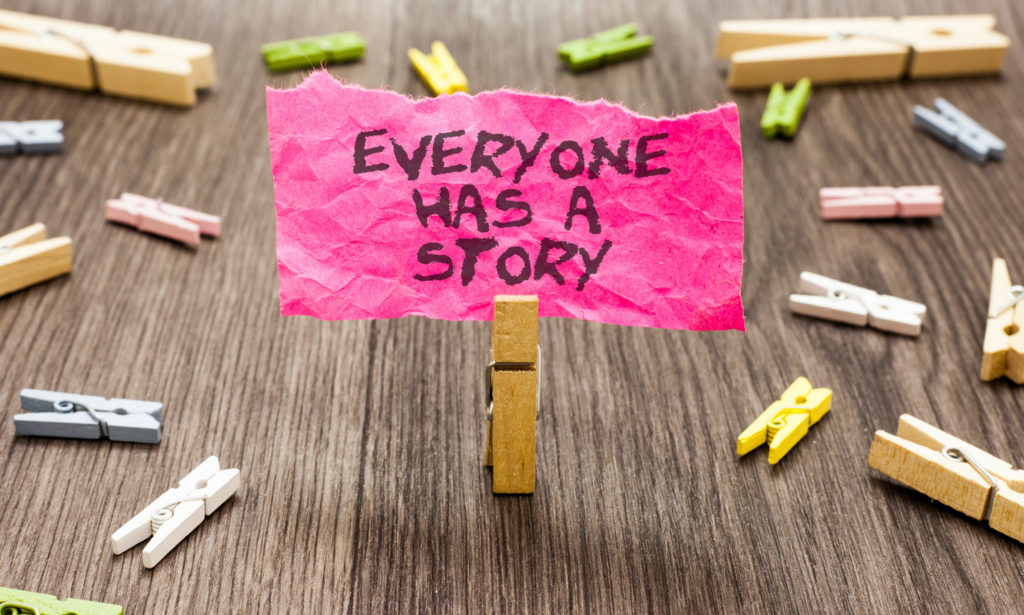Why do we like stories so much? Maybe because they helped us become who we are today
We human beings love stories, be it in written form, like when we read a novel, or verbally transmitted, like we have done for centuries to pass the cold winter nights around a fire.
Stories can take the shape of fairy tales, fiction novels, mythology, gossip, movies, Netflix series, and other thousand different forms. We cannot get enough stories when we are awake, so we create even more stories when we dream in our sleep.
We seem to think and make sense of the world in stories. It seems humans cannot get enough of their stories.
Why is that?
Why do we like stories?
I am a convinced Darwinist, so when I face a question about human or animal traits, I always look at it from an evolutionary perspective first.
The question to ask then is this: how did storytelling help humans survive and/or have more offspring?
All animals can communicate with each other. They have some kind of language, but none as developed as humans. Many things make humans stand out in comparison to other animals, like the opposable thumb that allowed us to use tools with dexterity or the outsized dimensions of our brain, but following Harari’s thoughts in Sapiens, what really made a difference was our language and our capacity to mobilise and coordinate large groups of individuals using narratives.
To put it in other words, we became the dominant species on our planet thanks to our capacity to tell stories.
Humans were able to gather in groups bigger than the original tribes and clans, thanks to stories. These stories allowed increasingly larger groups of people to get together, first in the hundreds, then in the thousands, and then in the millions, to work towards a common goal.

In the beginning, these stories would be about religion and mythology, later about nationalism, philosophical currents, or political movements such as fascism or communism.
Companies like Apple or Google are fictions we have created, powerful fictions at that, like money itself, which isn’t but a story about trust that this piece of paper or metal coin holds the value that we have all agreed to give it.
All these are stories, but essential stories that allow our societies to function and have allowed the human species to reach levels of progress and understanding of nature that no other animal has ever achieved.
The best storyteller gets the prize
We cannot go back in history and see how our ancestors benefitted from storytelling or not, but we can look at hunter-gatherer groups today. This is what some anthropologists did by studying the Agta tribes in the Philippines.
They did several experiments, and they found out that the tribes that had better storytellers cooperated more and worked better as teams, thus getting better results from their labour. Not only did the tribes work better, but also the individuals that were better storytellers were more popular, got to mate with the best partners available and had more and healthier offspring.
Storytellers seemed to be the prehistoric equivalents of modern-day rock stars.
This is how natural selection basically works.
Compounded over generations, tribes with better storytellers and with people that were more predisposed to listen to and enjoy those stories would outperform the tribes with poor storytellers or no liking for stories. Also, individuals with a knack for storytelling would be successful and respected in their groups, and they would pass on their genes to the next generations.
Stories were helpful and made us stronger and better prepared to survive, so they became a necessary part of our lives and psyche. We evolved to like telling and listening to stories.
Even if we evolved to like stories because they helped us function as a society, the way it works is weird and surprising.
Think about it. We can spend hours lying on a sofa staring at some lights on a screen or looking at black ink characters printed on sheets of paper in what we call reading, immersed in a fictional world that makes us entirely forget what is happening around us in the real world.
It amazes me every time I think about it.
The Art of Storytelling
We are wired to like certain types of stories.
The variety of stories we can like is vast and different people will like different types, like everything in life. Still, some common elements usually make good storytelling.
Storytelling is a valuable skill to have, whether you want to become a writer (or, god forbid, a blogger), entertain your friends after dinner, or become a great leader.
It is helpful to have the following points clear.
Clear central message
A story without a clear central message won’t engage the audience.
This is valid for a story with no message at all or with too many. It is advisable to think about the message you want to transmit, what is the main message you want your listeners or readers to get from the story, and stick to it.
Conflict, hurdles and obstacles
Every story needs to have a conflict, obstacle, hurdle, or difficulty, or there is no story.
The best stories make us suffer and agonise with the protagonist and then be happy when they finally triumph.
This might seem more applicable to novels and fiction, but it is also valid for corporate and business storytelling. Telling about the obstacles a team or company had to endure, how they overcame them and what they learned from them is a sure way to captivate an audience.
Structure
Before I start writing a post or preparing a speech or presentation, I always think about the big ideas I want to write or talk about and their natural order for the story to flow.
You don’t need to have it all prepared word by word, but having a clear structure in your mind (or written in bullet points) makes it easier to write or tell the story.
It is also easier to follow for the audience. There is nothing worse than a story with no structure, shape or form that makes us feel lost and confused when we read or listen to it.
Make it personal
We are human beings, not robots.
We have emotions, and we have evolved to feel empathy for other human beings, so make your story personal. It will make it more authentic and human and will connect better with the audience.
Even if you are talking about the economy, politics, or business, there is always a way to connect it to your personal experience, feelings, and history. Making a story personal requires showing vulnerability and opening up, but there is nothing wrong with it. It will even help you connect better with others and learn new things about yourself.

Keep it short and to the point
There is no need to adorn your story with unnecessary words or side stories. Be concise and to the point.
People have increasingly reduced attention spans, so you will lose your audience if you flourish your story with superfluous information. In addition, your central message will get diluted and lost among all the noise.
Engage your audience
The reason you are telling a story is to engage an audience.
You want to entertain them, help them learn something new, motivate them, or sell them something. Whatever it is, you tell the story because you want something from the audience, and you want to give them something, your story, in return. If you don’t engage the audience, you will fail.
All the points mentioned above will help you engage and captivate your audience, but you also need to make an effort to understand who your audience is, what they need, and what they like, and then adapt your story accordingly.
This is probably the most important tip regarding storytelling or any sort of communication: know your audience and adapt the story to it.
The hero’s journey
Some anthropologists have studied what is known as the Hero’s journey. This is a sort of template that is often followed by different mythologies and stories, from Homer’s Odysseus to Star Wars or Harry Potter.
Many stories that we find captivating seem to share some elements of this journey.
There is always a hero who has an uneventful and quiet life, which is disrupted by an event. The hero receives a calling, which he or she initially ignores, but finally goes on an adventure, faces some challenges or crises, and comes home victorious and transformed, with a learning or new development.
There is something in the human psyche that makes us enjoy stories that follow this pattern.
Analyse the great fiction stories that have captured our imaginations over the centuries. You will usually find some elements of the hero’s journey, if not all. We seem to enjoy stories about a hero who faces some crisis that ends up changing them.
Life is a journey of self-development, self-discovery, and personal growth that only ends with death.
What makes us human is that desire to improve and get better. There are many tools to learn, grow, and know ourselves and others better, and storytelling has been one of the most important ones from the beginning of time.
Pay more attention to the stories that captivate you. Listen to what they tell you, and try to become a better storyteller yourself. We have evolved to love stories, and we will continue doing so for the foreseeable future.
Being a good storyteller can help you in many aspects of life, even if it no longer will give you the rock star aura of ancient times.